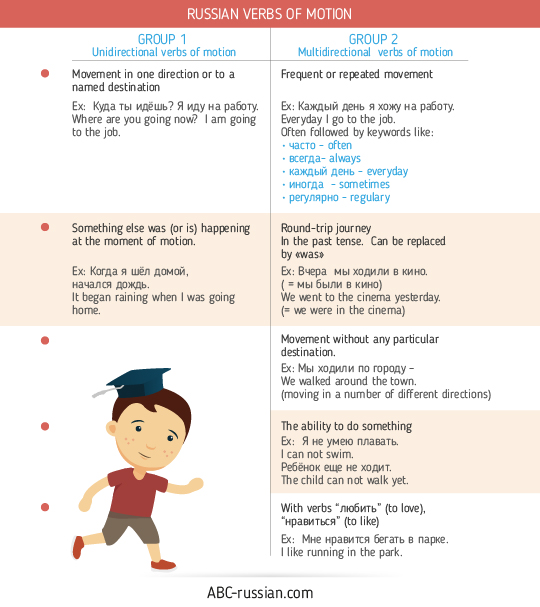This the continuation of the topic "Russian verbs of motion", the first part you can read here.
Step by step we will learn this challenging grammar topic.
Learning about the verbs of motion can be one of the hardest concepts in the Russian language. It is not so difficult if you take them one step at a time.
However complex an idea it may seem, it is an important concept, since motion verbs are among the most used in any language.
And remember that all unprefixed verbs of motion are imperfective.
Verbs of motion go in pairs and have their rules and irregularities. Once you've familiarized yourself with the first pair of verbs, you'll have an idea how to use the rest of the verbs of motion.
As I Have already said that all the verbs of motion are divided into 2 groups:
1) unidirectional ( let’s call them Group N1 or «идти» group) and
2) multidirectional form ( let it be Group N2 or group «ходить»)
All the names of these groups you’ll find in any Russian grammar or textbook.
Let’s start from the first group.
(look into the left column in the picture)
Verbs of this group is also called unidirectional verbs of motion. They denote:
1) movement in one direction or to a named destination.
For example:
A main function of multidirectional verbs of motion is to describe repeated return journeys and habitual actions.
Step by step we will learn this challenging grammar topic.
Learning about the verbs of motion can be one of the hardest concepts in the Russian language. It is not so difficult if you take them one step at a time.
However complex an idea it may seem, it is an important concept, since motion verbs are among the most used in any language.
Russian Verbs of Motion. Part 2
As you already know, Russian verbs of motion always come in pairs: there are two verbs for each type of motion, a multidirectional and a unidirectional form.And remember that all unprefixed verbs of motion are imperfective.
Verbs of motion go in pairs and have their rules and irregularities. Once you've familiarized yourself with the first pair of verbs, you'll have an idea how to use the rest of the verbs of motion.
As I Have already said that all the verbs of motion are divided into 2 groups:
1) unidirectional ( let’s call them Group N1 or «идти» group) and
2) multidirectional form ( let it be Group N2 or group «ходить»)
All the names of these groups you’ll find in any Russian grammar or textbook.
Let’s start from the first group.
(look into the left column in the picture)
Russian Verbs of Motion. Group 1
1) movement in one direction or to a named destination.
For example:
- Куда ты идёшь? Я иду на работу. (movement in one direction)
- Where are you going now? I am going to the job.
- Мария идёт в университет. (named destination)
- Maria is going to the university.
Russian Verbs of Motion. Group 2
A main function of multidirectional verbs of motion is to describe repeated return journeys and habitual actions.
Verbs from this groups denote:
1) Frequent or repeated movement
- Каждый день я хожу на работу. Everyday I go to the job.
- Два раза в неделю Ваня ходит в спортзал. Vanya goes to the gym twice per week.
Often followed by keywords like:
- часто - often
- всегда- always
- каждый день - everyday
- каждый + вторник, сентрябрь, выходные etc.- every Tuesday, every September, every weekend etc.
- иногда - sometimes
- регулярно - regulary
- никогда - never
2) Round trip journey (in the past tense) Can be replaced by the verb "was"
- В пятницу мы ходили в театр = В пятницу мы были в театре.
- On Friday we went to the theatre = We were in the theatre.
- В апреле мы ездили в Суздаль = В апреле мы были в Суздале.
- We went to Suzdal in April = We were in Suzdal in April
3) Movement without any particular destination or in a number of different destinations.
(imagine that you came as a tourist to Moscow or to any other city and you just walked around all the day)
- Мы долго ходили по городу. We walked around the city for a long time.
4) The ability to do something.
Russian verbs of motion of this group denote the ability of the person to do something - if you can swim, run quickly, drive a car - this the ability that you already have. You describe this ability with the help of the verbs of motion from the second group)
- Ребёнок еще не ходит. A child can not walk yet. (he is too small and can not walk yet)
5) with verbs любить ( to love) and нравится ( to like) Actually when you use verbs like любить and нравится you describe your habitual actions.
- Мне нравится бегать в парке. = I like running in the park.
These are the main meanings of Russian verbs of motion of moth groups. The idea is - to understand how the systems works. You can have a look into this table and all the verbs from the left column will have all these meanings for group 1 and as a consequence all the verbs from the right column will have all the meanings described here for the second group.
If you are comfortable with the concept learnt in these parts, you can easily apply this same concept to the other verbs of motion.
Feel free to ask questions in the comment box!

No comments :
Post a Comment